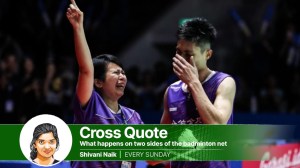India’s need to take a leaf out of China’s book
The Chinese women, gunning for 2008 Olympic gold, are trying to make hockey popular by prom...

|
India’s Mamta Kharab (R) dribbles past South Korea’s Ki Sook Hyun during their women’s hockey match at Busan.South Korea won 5-0. Reuters
|
The biggest shock emerging from Busan for India is the women hockey team’s debacle after they won the Commonwealth gold just two months ago. In fact, the Indians may have to pack their bags as early as Wednesday unless they can produce a miracle in the last match, which is against Japan. India face elimination in the four-nation competition if they cannot beat Japan by a huge margin since China are the favourites for the other slot in the finals, having beaten India in the league. Korea have already reached the final.
Even a miracle theory seems far-fetched for the winners of the first Asian Games gold in 1982, particularly after their two losses, including a 0-5 whitewash at the hands of defending champion Korea. No doubt, the competition at Busan is probably one of the toughest seen in the Games — China and Korea are on par with the Hockeyroos, the World and Olympic champion. However, the Indians, who were runners-up in the previous Games, have struggled to keep pace with the rest.
For Indian fans, the drooping shoulders and sagging spirit of the team at Busan was perplexing, particularly after it was hailed and cited as an example for men’s hockey to follow.
|
India at games today
|
||
|
• Athletics: Men: hammer throw, shotput, 400m hurdles. Women: 800m, 100m, 10,000m run. |
||
The IWHF, which basked in the Commonwealth Gamnes glory, should not make the mistake of blaming the Asiad debacle on factors like loss of form or absence of rythm in the team.
In fact, the reasons for the team’s debacle are deep-rooted. While India have a glorious tradition in hockey, the absence of a proper system — like in China and Korea — to groom and train with best exposures continues to reflect on the performance at the top level. In the 1999 Asia Cup, India finished ahead of both China and Japan.
Ever since the China signed up South Korean coach Kim Chang Hack in 2000, their steep learning curve has taken them to the Sydney Olympics (finished fifth), fourth place in the 2001 Champions Trophy and a landmark win over mighty Australians in the elite six-nation Champions Trophy at Macau this year. Besides, the Chinese have used the services of top fitness trainers from European countries. ‘‘The Chinese system looks like a paradise. Working with professional players who only have to think about hockey, enough time to train (20 to 24 hours a week) and a good organisation with assistent trainers, groundsmen etc,’’ commented the Dutch trainer, Remco Hartgers, after her stint.
The Chinese women, gunning for 2008 Olympic gold, are trying to make hockey popular by promoting six-a-side tournaments in elementary and secondary schools. Interestingly, the Chinese sports administration has decided to count one hockey gold medal as four in the medal tally at the coming Cities’ Games in 2003.
At Macau, English coach Tricia Herbie understood China’s rise when she said, ‘‘China is continuing to emerge. We can see clearly that they are a particularly athletic, skilful and fast team.’’
The Korean Hockey Associaton put their successful men’s coach Sang Ryul Kim after the 2002 World Cup at Kuala Lumpur in charge of the women’s team. Ryul is an acknowledged hockey guru and spent couple of years studying Indian hockey at NIS, Patiala. Perhaps, Indian hockey administrators depend too far on natural talent and skills of our players to produce results without providing them scientific and technical support. A glimpse of that was apparent in Busan.
Photos



- 01
- 02
- 03
- 04
- 05




























